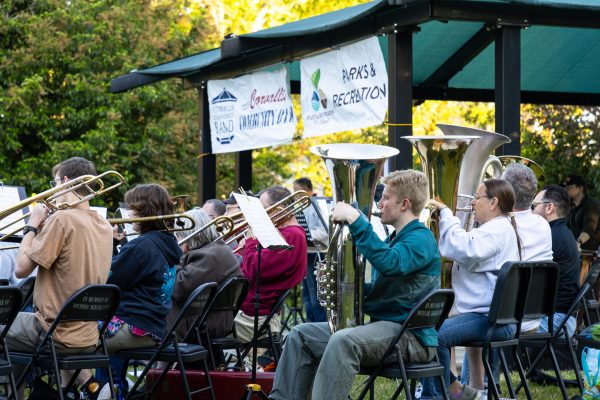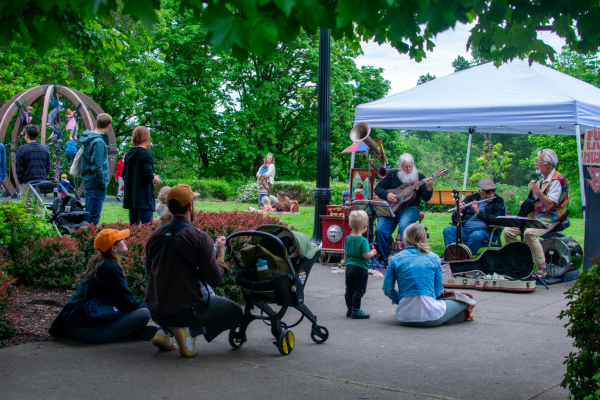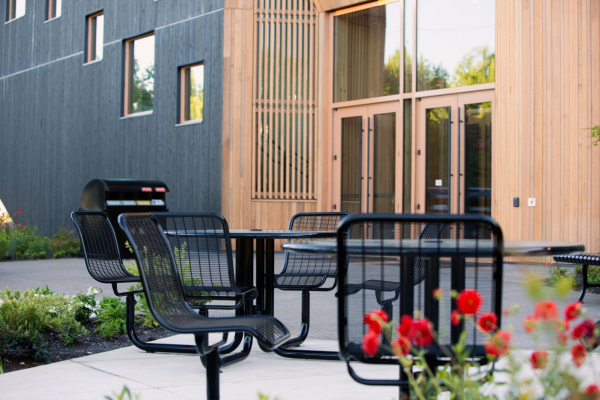“We’re still demanding our rights”: As Pride Month begins the fight for equality does not stop
A staged image of a hand making a heart in front of a transgender flag photographed on June 1 in the SEC Plaza.
June 5, 2023
Despite an increased recognition of LGBTQ+ rights, the fight for equal rights is not yet over.
The Stonewall Uprising began in a gay club, the Stonewall Inn, located in Greenwich Village in New York City, when the NYC police raided the club. This raid led to a riot as the police “hauled employees and patrons out of the bar,” according to History.com.
What followed was six days of protests and violent clashes with law enforcement outside the bar. To honor the 1969 Stonewall Uprising, a tipping point for the Gay Liberation Movement, Pride is now celebrated in the month of June.
However, some in the community have pointed out how Pride Month seems to have made a turn somewhere along the way, and is now a performative measure for large companies and corporations, rather than commemorating and honoring the achievements and struggles the LGBTQ+ community has and continues to face.
Tali Ilkovitch, a member of the community who works within the Pride Center on the Oregon State campus, recalled a time that they were celebrating pride in a bar, and were “basically treated like a zoo,” by other bar goers, stating that a queer space is rare to come by.
“Visibility is really important. But it’s also visibility without numbers and without people supporting us and keeping us safe is just us putting ourselves at risk…there’s a balance there,” they said.
Carter Trinidad, another member of the community who also works within the Pride Center, spoke about how it is nice and important to celebrate, but to remember that pride began as a riot.
“We’re still demanding our rights; we’re still fighting for today … there’s so many people that are still being left behind,” Trinidad said.
Ilkovitch offered alternatives to a pride party and parade that an ally of the community could partake in such as lobbying, showing up to the city council, voicing opinions, mutual aid items and asking individuals to take their own personal time to learn and educate themselves on issues of the community.
“We (the LGBTQ+ community) do so much unpaid emotional labor to educate people … Pay trans people of color, patrons, people of color, especially if they’re educating ” Ilkovitch said.
According to the Trans Legislation Tracker, available for free online, in 2023, 79 anti-trans bills have been passed out of 556 that have been proposed across the country. At this time, of these 79 bills, 71 have been signed into law and 8 others have passed, but have yet to be vetoed or signed.
For comparison purposes, the Trans Legislation Tracker noted that in 2022, 26 anti-trans bills passed out of 174 proposed–this is approximately a 15% passing rate.
This year, in just one month, the U.S. doubled the number of anti-trans bills being considered across the country from the previous year.
Some of these anti-trans bills targeting gender non-conforming performance, deemed, “drag bans” such as Arizona Senate bill 1026, which “use(s) broad definitions like dressing ‘in clothing and makeup opposite of the performer’s … gender at birth”’ and using language like ‘drag show targeting minors’ to insinuate harmful intent.”
There are a number of bills that would affect transgender individuals on an educational level as well, such as bill AZ SB1700, which encourages parents to report and ban books that are said to promote gender fluidity or gender pronouns.
Another bill that would affect the transgender community is the AZ SB1001, which requires a guardian and teacher to approve of a student’s pronouns.
In 2023, there has been an escalation on healthcare, seen in states like Kansas, Oklahoma, and South Carolina that are introducing bans on gender-affirming care that extend into adulthood — up to 26 years old.
“If there’s anything I want cis folks to understand … we’re not being dramatic when we’re saying that this is literally like fascism … it’s banning everyday trans (and gender non-conforming) folks being in public … you can literally be arrested, or … not able to play sports or use the bathroom,” Ilkovitch said.
According to Trinidad, this is what makes celebrating Pride difficult: knowing that some individuals within the community are less affected by what is happening systematically, while trans people are being targeted.
Both Ilkovitch and Trinidad expressed that action needs to occur and policies need to be passed that protect the LGBTQ+ community in order for there to be solidarity with the community and among the city of Corvallis.
“These are just like basic rights … if you can’t go into public, how do you work? How do you survive? It just eliminates the ability to physically exist. I feel like maybe people don’t make that jump … it literally writes us out of existence, in society,” Ilkovitch said.
As more anti-trans legislation passes in other states, individuals in the community, such as Trinidad and Ilkovitch have noticed, what they call, a “queer migration” from Midwest states to more Northern states and more open states such as California.
Trinidad spoke about their experience working as a pride mentor, noting how many students from Midwest states mentioned moving because they didn’t feel safe there. However, they also mentioned that students would have the expectation that there would be a safe place here in Corvallis, but that some still can’t find that space.
“I think that with this anti-trans legislation, people need to also realize that this has been happening to us for centuries, like hundreds of years, thousands of years,” Trinidad said. “They’re forgetting about their black and brown trans brothers and sisters who have been continuously affected through this.”
Although this is the fourth consecutive record-breaking year for anti-trans legislation in the U.S., instances of targeted gender discrimination is evident throughout history. Trinidad gave the example of when the Spaniards arrived during the era of colonization.
The Spaniards aimed to eliminate indigenous culture and even outlawed their cultural practices related to gender, which led to the genocide of indigenous peoples, spanning two regions in Mexico.
According to Trinidad, these indigenous communities and many like them are now experiencing ongoing cultural and gender revival and reclamation.
“We cannot keep indigenous people out of the conversation because we are on indigenous lands,” Trinidad said. “There’s so many other immigrant communities that have come over that have their own cultural practices that include multiple genders … so it’s very important to add on the intersectional lens when talking about anti trans legislation laws.”
























































































































